Editorial
Solution becomes problematic

Wednesday 28th June, 2023
Whammies do not seem to come singly for Sri Lankans. As if the ongoing frantic efforts to restructure domestic debt, and sinister moves being made in some quarters to trigger a bank run were not enough, thousands of people are protesting near all District Secretariats against their exclusion from the new social protection scheme, Aswesuma. The extension of the deadline for appeals has not helped make them simmer down.
What possessed the government to essay the launch of Aswesuma at this particular juncture? Is it labouring under the misconception that having crushed Aragalaya, it is capable of neutralising dissent and bulldozing its way through, and therefore does not have to worry about the consequences of its actions? Protracted protests are fraught with the danger of spinning out of control, and the government cannot be unaware of this fact.
Social protection schemes, like all other public sector programmes, have failed in this country mainly due to poor targeting, politicisation, corruption and various other forms of malpractice. Instead of addressing the root causes of this problem, successive governments have introduced new social welfare programmes for political reasons, and they too have failed. Odds are that Aswesuma will go the same way as Janasaviya and Samurdhi.
As for the deficiencies of the Samurdhi scheme, the solution would have been to launch a probe to identify those who were fraudulently benefiting from poor relief. The general consensus is that a large number of people who are above the poverty line have been receiving Samurdhi benefits owing to corruption among the state officials who administer the welfare programme, and political interference. In fact, complaints abound that even middle-income earners are benefiting from Samurdhi assistance. These shameless elements must be mingling with the genuinely aggrieved Samurdhi beneficiaries who are up in arms and deserve redress.
Aswesuma, which was expected to help solve the current economic crisis shows signs of becoming a problem itself owing to serious lapses on the part of those who selected its beneficiaries. It behoves the government, as we argued in a previous comment, to put the new social protection scheme on hold lest Samurdhi beneficiaries’ protests should develop into an uprising, threaten political stability and jeopardise the ongoing efforts to achieve economic recovery.
****
Hobson’s choice
The prospect of being adversely affected by what is euphemistically called domestic debt optimisation worries all those who have deposited their hard-earned money with banks or invested it in government securities, but Sri Lanka finds itself in an unprecedented situation, where such painful action has become inescapable. Needless to say, when a country exhausts its foreign currency reserves and becomes bankrupt before seeking IMF assistance, it is left without any bargaining power and, therefore, has to submit to the dictates of the lender; the people are suffering losses and facing hardships for no fault of theirs. This is the price a country has to pay for electing misfits to positions of power and allowing them to mismanage the economy and enrich themselves with impunity.
Concerns being expressed about the ill-effects of domestic debt restructuring are to be appreciated, but the question is whether there is an alternative. There is no turning back now.
The restructuring of external debt will hurt foreigners who are in no way responsible for Sri Lanka’s economic crisis. They cannot be expected to be so altruistic as to bear all losses so that Sri Lankans do not have to make sacrifices to come out of the current crisis. On the other hand, one of the conditions for the IMF bailout is that the debt-to-GDP ratio be reduced drastically. Not for nothing is it said that unless domestic debt is brought down to a manageable level through restructuring, taxes will have to be increased further to boost state revenue to achieve debt sustainability. It is a case of Hobson’s choice for the public.
How the government intends to restructure domestic debt will be known only when it presents its ‘debt optimisation’ plan to Parliament. SJB MP and economic Dr. Harsha de Silva has rightly called upon the government to adopt a cautious approach and ensure fair treatment for all. One can only hope that it will tread cautiously, heeding warnings from the Opposition and other concerned parties, and what is feared will not come to pass.
Editorial
Ranil’s advice

Saturday 21st December, 2024
Former President Ranil Wickremesinghe has urged the SJB-led Opposition to act responsibly and help ensure the continuity of the IMF bailout programme, which has enabled the economy to regain some stability. He has also thanked the NPP government for having kept the IMF programme on course.
Wickremesinghe’s exhortation to the Opposition and unsolicited advice to the government are timely but not devoid of politics. He is seeking the credit for what the country has achieved through the ongoing IMF programme, which got underway in earnest under his presidency. In fact, it is doubtful whether any other President would have had the courage to make a host of unpopular yet essential decisions to address the economic crisis. So, Wickremesinghe is not without a moral right to ask the government and the Opposition to act prudently and help the country make the most of the IMF programme. It is hoped that the Opposition and the government will heed Wickremesinghe’s advice and act accordingly.
Sadly, the SJB has chosen to play to the gallery, asking the government to renegotiate the IMF programme. It could not even sort out an internal dispute over its National List appointments, and one of its constituents resorted to legal action. So, how can such a political party claim to be able to make the IMF bend to its will? It is obviously trying to earn brownie points with the public by bellowing rhetoric.
The IMF programme is no economic panacea, but it will surely help Sri Lanka gain economic stability in the short-term. It has already yielded some tangible results. Much more remains to be done to ensure Sri Lanka’s long-term economic wellbeing, and it is up to the current dispensation as well as future governments to develop the economy and achieve debt sustainability.
Nobody likes IMF bailout conditions, which can be extremely harsh, but they are a prerequisite for a bankrupt country’s economic recovery. If Sri Lanka managed its economy properly, it would not have had to ask for IMF help, which comes with constricting conditions. However, what the IMF has prescribed is what Sri Lanka should have done on its own a long time ago.
When a country spends more than it earns and goes on borrowing recklessly from external sources to meet its revenue shortfall, it runs the risk of facing an economic crisis. The Mahinda Rajapaksa government indulged in wasteful expenditure; it spent a great deal of borrowed money on Ozymandian projects. The UNP-led Yahapalana government also borrowed heavily. The JVP backed that administration to the hilt. The Gotabaya Rajapaksa administration, in its wisdom, slashed taxes and tariffs, oblivious to the disastrous consequences of its harebrained action. The Covid -19 pandemic came, necessitating prolonged lockdowns, which took a heavy toll on the economy. The rest is history.
A person who falls into a well has to come out of its mouth, as a local saying goes. There is no other way out. Sri Lanka finds itself in a similar situation. Having ruined the economy, it found itself at the bottom of an economic pit. Thankfully, in answer to its pitiable pleas, the IMF threw a lifeline, which has enabled it to come halfway up. Needless to say, nothing will be stupider than for it to let go of that lifeline.
Editorial
Lest watchdogs should become lapdogs

Friday 20th December, 2024
The JVP-led NPP’s ascent to power rekindled the hopes of good governance activists for a radical break from the past and a new political culture. The incumbent government came under pressure to ensure the independence and integrity of the parliamentary Financial Committees by allowing them to be headed by Opposition MPs. But the efforts of the campaigners for good governance have been only partially successful. SJB MP Dr. Harsha de Silva has been appointed the Chairman of the Committee on Public Finance (COPF), and the government has said one of the NPP members should head the COPE (Committee on Public Finance).
The government’s position is that the COPE will conduct investigations into what happened under the previous administration and therefore an NPP MP should chair it. The Opposition’s efforts to persuade the government to change its mind have been in vain. President Anura Kumara Dissanayake himself reiterated the NPP’s position in Parliament on Wednesday in response to a request from Opposition Leader Sajith Premadasa that the government reconsider its decision.
The COPE plays a pivotal role in exposing irregularities in state enterprises and has the potential to restore public trust in Parliament. According to Standing Order No. 120, the duty of the COPE is to examine the accounts of public corporations, institutions funded wholly or in part by the state and of any business or other undertaking vested under any written law, with the assistance of the Auditor-General. One of the criticisms against the COPE is that its probes do not yield the desired results, and its reports gather dust. But there have been glaring exceptions.
The COPE under Dr. Wijeyadasa Rajapakshe’s chairmanship, during the Mahinda Rajapaksa government, played an activist role, paving the way for the reversal of a questionable divestiture programme—the privatisation of Sri Lanka Insurance Corporation and Lanka Marine Services. Similarly, the COPE under D. E. W. Gunasekara’s chairmanship was bold enough to produce a damning report on the first Treasury bond scam in 2015, but the UNP had Parliament dissolved, forestalling the submission of that vital document to the House. The COPE carried out its second probe into the Treasury bond scams under the chairmanship of the then Opposition MP Sunil Handunnetti. Thus, the COPE has proved its ability to safeguard the interests of the public, and the precedents it has set should be followed. Handunnetti, who is a powerful minister in the incumbent government, ought to lend his voice to those who are demanding that an Opposition MP be appointed as the COPE chairperson.
Situations could arise warranting investigations that adversely impact the interests of the incumbent government. If the COPE chairperson is a ruling party MP, he or she, under such circumstances, will not be able to act impartially owing to his or her party loyalty. This is why the campaigners for good governance insist that the parliamentary watchdog committees should be chaired by the Opposition.
The government’s argument that it has to appoint one of its MPs as the COPE chairperson because the irregularities to be probed occurred under the previous dispensation, whose MPs are currently in the opposition, is not tenable. The vast majority of the Opposition MPs in the current Parliament were not members of the previous administration, which became a metaphor for corruption, and therefore one of them can be appointed the COPE head.
The COPE will have to probe irregularities in state institutions during the current administration as well, and a ruling party MP functioning as its chairperson will be constrained to act in such a way that he or she is seen to be biased; the integrity of the watchdog committee will be compromised in such an eventuality.
One can only hope that the NPP will change its position and let an Opposition MP be appointed as COPE head.
Editorial
Hobson’s choice and U-turns

Thursday 19th December, 2024
The JVP-led NPP government is quite upbeat about President Anura Kumara Dissanayake’s India visit. However, if the joint statement Dissanayake and Prime Minister Narendra Modi issued on Monday (16 Dec.) is anything to go by, the NPP administration has endorsed what its leaders used to flay President Ranil Wickremesinghe for having undertaken to do at the behest of India, much to the interests of Sri Lanka’s interests. Wickremesinghe has thanked Dissanayake for endorsing the Economic and Technological Cooperation Agreement (ETCA) to be signed between India and Sri Lanka. This can be considered a backhanded compliment.
As for the projects of strategic importance mentioned in the joint statement, PM Modi has said nothing new; he has only reiterated what he expected the previous Sri Lankan governments to do. He has highlighted his government’s desire to see the completion of some vital projects such as the supply of LNG to Sri Lanka, a high-capacity grid connection between the two countries, a petroleum pipeline from India to Sri Lanka, and the further development of the Trincomalee oil tank farm. It is a case of Hobson’s choice for Sri Lanka.
The joint statement also mentions some benefits to Sri Lanka in areas such as energy development, education and technology and agriculture.
PM Modi and President Dissanayake have agreed to continue discussions on the development of airports in Sri Lanka. One can only hope that Sri Lanka will not come under Indian pressure to award contracts for airport development to the Adani Group, which is under a cloud. Congress MP Rahul Gandhi has accused the Modi government of ‘tweaking rules’ regarding India’s airport privatisation programme in favour of the Adani Group.
Meanwhile, PM Modi said at a joint press conference with President Dissanayake on Monday that they had discussed reconstruction and reconciliation in Sri Lanka, and he hoped that the Sri Lankan government would fulfil the aspirations of the Tamil people and its commitment to implementing the Constitution of Sri Lanka (read the 13th Amendment) fully, and conduct the Provincial Council elections. PM Modi also said he and Dissanayaka were in full agreement that ‘our security interests are interconnected’, his message being that Sri Lanka has to be mindful of India’s security concerns.
The biggest challenge before the NPP government is to justify the numerous about-turns of its main constituent, the JVP, which signals left but turns right erratically, and provides grist to the Opposition’s mill, in the process. JVP leaders are doing exactly the opposite of what they advocated as regards some crucial issues during their opposition days; their policy contradictions are legion. They have made U-turns on the IMF bailout programme, rice imports, taxes, tariffs, petroleum prices, the MPs’ perks and privileges, and a host of other issues.
Addressing a seminar under the theme, ‘Trading, Sacrifice and ETCA’, in Colombo in Sept. 2016, JVP leader Dissanayake said the agreement, if signed, would pave the way for an influx of ‘low-grade Indian IT professionals’ here at the expense of the Sri Lankan youth. According to a report published on the JVP’s official website (23 Feb. 2016), Dissanayake had this to say about ETCA, at the first of a series of seminars held under the theme ‘Denounce ETCA that sacrifices our economy to India!’: “There is a political gamble here. India is trying to intervene in politics in our country. Already, there are many RAW spies in Jaffna. Before our country is made a political playground India wants to gobble our economy. Already India has a monopoly in the vehicle, medicine and construction sectors. Already, they are controlling our economy. Through that they manipulate politics in our country. It is this political need that jumps out of Ranil’s mouth. We would never allow this agreement to be signed.”
The question is what those ‘RAW spies’ in Sri Lanka were doing during this year’s presidential and parliamentary elections.
In a video (dated 19 September 2023) doing the rounds on the Internet these days, Dissanayake opposes the Indo-Lanka connectivity project; he says the proposed projects such as the grid connection, the petroleum pipeline, etc., are detrimental to Sri Lanka’s independence.
It will be interesting to see what the opponents of ETCA, especially the professionals, who backed the NPP to the hilt in the presidential and parliamentary elections this year, have got to say about the incumbent government’s about-turns and acquiescence to India’s demands.
Meanwhile, Foreign Minister Vijitha Herath is heard speaking of ‘bondages’ between India and Sri Lanka, during a brief television interview in New Delhi. Was it a mere lapsus linguae or a Freudian slip reflecting the JVP leaders’ subconscious antipathy towards what they once perceived as India’s suzerainty or hegemonistic interests?
-

 Opinion6 days ago
Opinion6 days agoDegree is not a title!
-
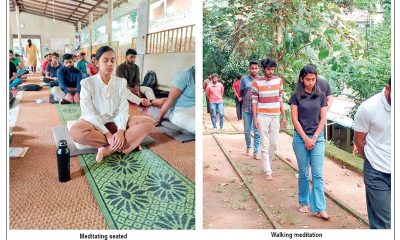
 Features7 days ago
Features7 days agoSpiritual Awakening of a Village
-
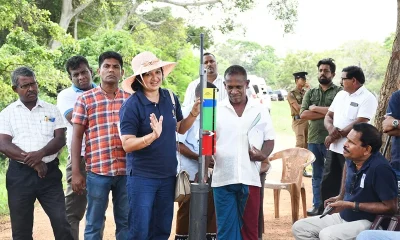
 News5 days ago
News5 days agoInnovative water management techniques revolutionising paddy cultivation in Lanka
-
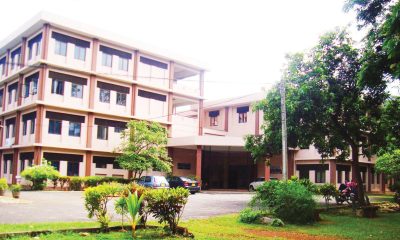
 Features7 days ago
Features7 days agoRevisiting the role of education in shaping shared futures
-
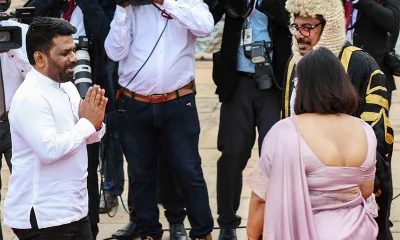
 Features4 days ago
Features4 days agoThe Degree Circus
-
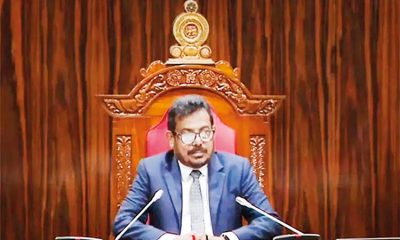
 Features7 days ago
Features7 days agoThe Silence of the Speaker and other matters
-

 Editorial6 days ago
Editorial6 days ago‘Compass’ under the microscope
-

 Editorial7 days ago
Editorial7 days agoPerks and privileges











